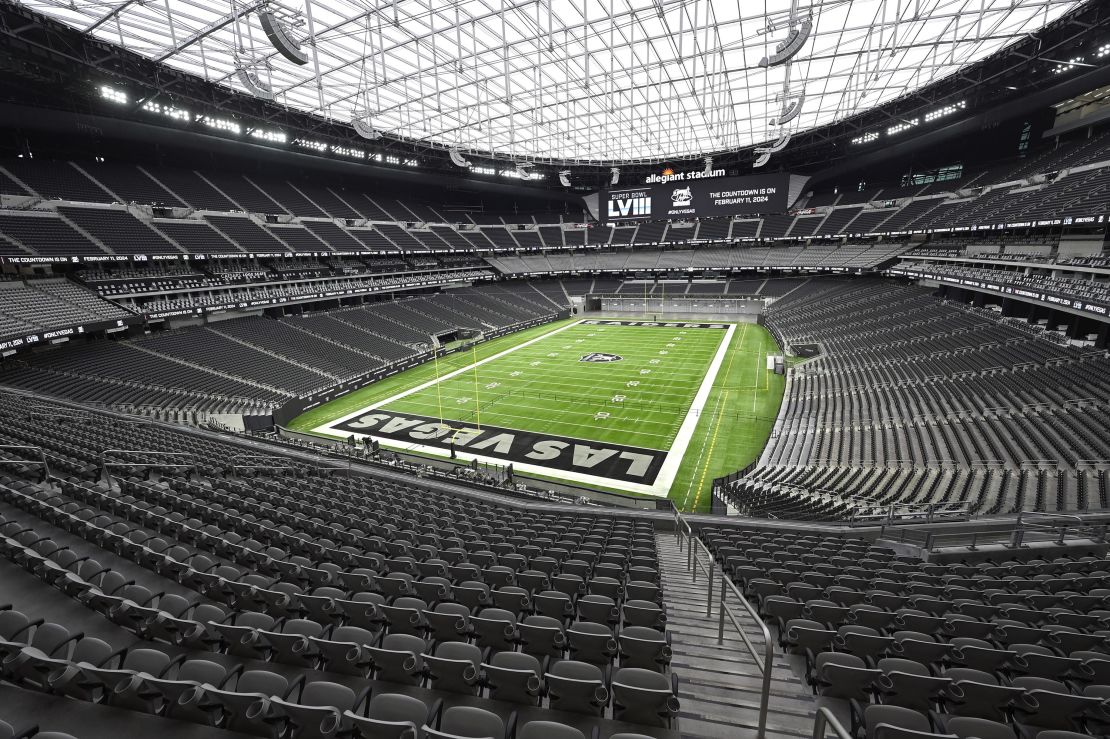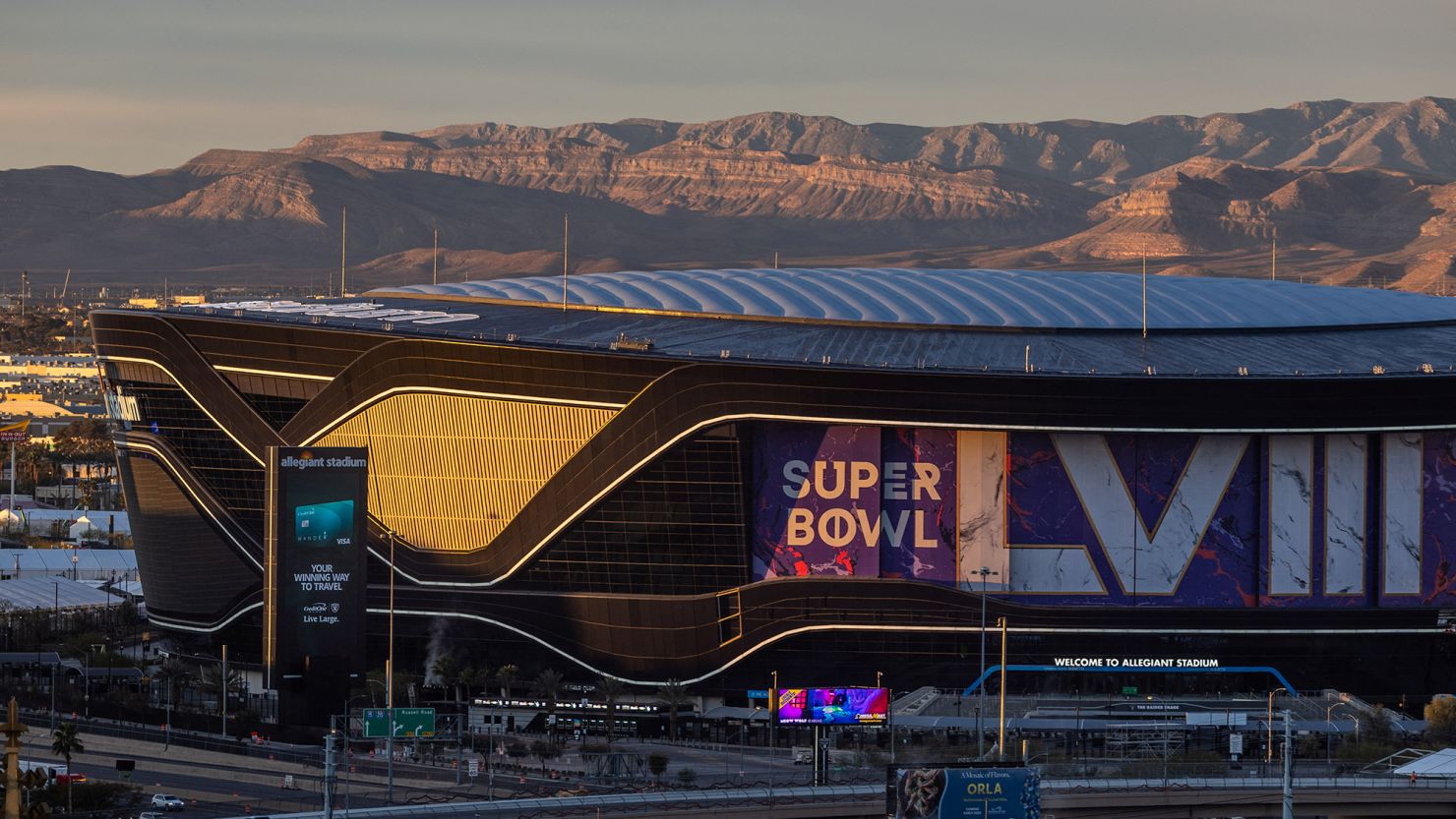After 18 weeks of NFL regular season games and three rounds of grueling playoff action, Super Bowl LVIII is set.
A general view of the Allegiant Stadium, the host of Super Bowl LVIII. Carlos Barria/Reuters
The Kansas City Chiefs will face the San Francisco 49ers on February 11 to crown the 2023 season’s champion.
The game will be played in Las Vegas at the Raiders’ state-of-the-art Allegiant Stadium, aka the “Death Star,” the first time the venue – and Nevada – has hosted the NFL’s championship game.
Here’s everything you need to know about the host venue for this year’s Super Bowl.
A new home
Opened in 2020, Allegiant Stadium was part of a monumental project spearheaded by Raiders owner Mark Davis.
He was the driving force behind the relocation of the Raiders organization – which had been historically located in Oakland, California – to the Silver State; a move which was announced in 2017 to the disgruntlement of many Bay Area-based fans.
The Raiders’ new 65,000 capacity stadium was built next to the Las Vegas Strip to accommodate the team; fittingly, it is located on Al Davis Way, a street named after the team’s former owner and Mark Davis’ father.
The stadium was built with a domed roof and, according to Sports Illustrated, $1.9 billion to construct.
The stadium is said to brings around $620 million annually to the local area, while also creating 6,000 permanent jobs in Southern Nevada.
The turf field can be moved depending on the event being hosted in the stadium. The stadium’s official website says it plays host to Raiders games as well as “world-class entertainment including concerts and special sporting events such as the Pac-12 Championship Game and Las Vegas Bowl.”
The sliding field tray weighs 19 million pounds which is a similar weight to the Eiffel Tower, per the official website, and is moved by 72 individual motors.

A general view of the playing field at Allegiant Stadium. David Becker/Getty Images/File
Roughly 105,000 cubic yards of concrete – akin to 257 miles of sidewalk from Las Vegas to Los Angeles – were used in construction and 425 trees were planted around the stadium. A total of 28,000 tons of structural steel were used too, which is heavier than the Statue of Liberty.
The stadium includes 75,000 square feet of video boards to keep fans up to date with what’s happening on the field, as well as over 2,300 televisions.
The hosting of the Super Bowl is estimated to bring in around $500 million for Las Vegas “through direct spending, additional tax dollar generation, increased room occupancy and job creation.”
The ‘Death Star’
“Welcome to the Death Star, where our opponents’ dreams come to die,” Mark Davis proclaimed ahead of the team’s first scrimmage at the stadium back in 2020.
Despite not really looking anything like the doomed Death Star – a giant planet-destroying space station that is twice blown up in the original Star Wars trilogy – the name has stuck.
Others, meanwhile, have noted on social media that the stadium shares a passing resemblance to a giant Roomba vacuum, which is certainly a more accurate description than the Death Star.
Whichever nickname it ends up becoming most known by, the jokes for both write themselves.
However, back in 2020, Davis was confident his Death Star would be more successful than its ill-fated namesake.
“That was THEIR Death Star. Not ours. Ours was built to sustain,” he told ESPN.
Former Raiders head coach Jon Gruden concurred with Davis, telling the Las Vegas Review-Journal in September 2020: “I think it’s a cool name for our stadium. I don’t give a damn about Star Wars. That’s what we’re calling our stadium and I don’t care what anybody else thinks.
“It’s a cool stadium, it’s a great name and we just have to play good when we’re in there.”
Similarly to the Oakland Coliseum where the team previously played its games, the Raiders constructed a large torch in Allegiant Stadium in memory of Al Davis following his death in 2011.
The initial idea for the torch was in recognition of Davis’ enduring vision that “the fire that burns brightest in the Raiders’ organization is the will to win.”
Prior to each Raiders home game, legends of the organization, celebrities or fans light the torch in memory of the former owner.
The first to light the torch at Oakland Coliseum in 2011 was the organization’s long-time head coach John Madden, who was hired by Davis in the 1960s andwon two Super Bowls with the team.
At the Allegiant Stadium, a 92-foot tall torch resides in the venue with Carol Davis – Al Davis’ former wife and mother of current owner Mark – being the first person to light it in 2020.
With the Raiders playing home games in 2020 without fans due to the Covid pandemic, various factions of the community were thanked for their service and were given the opportunity to light the torch.
Some of the groups who lit the torch during that season included frontline medical workers, local cancer survivors, Allegiant Stadium construction workers, Southern Nevada law enforcement agencies and food bank volunteers.





